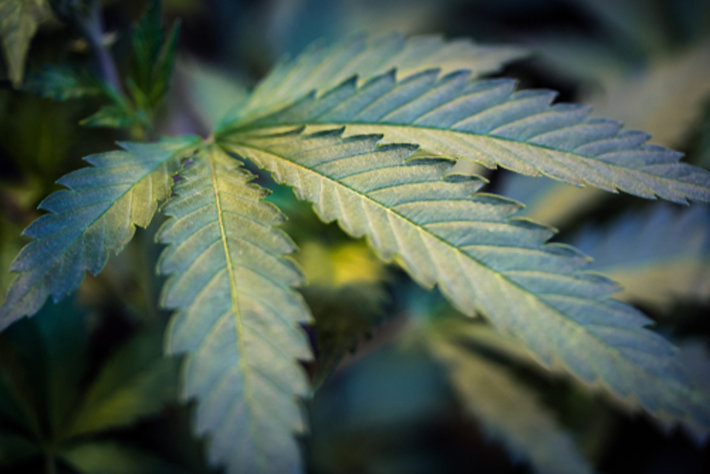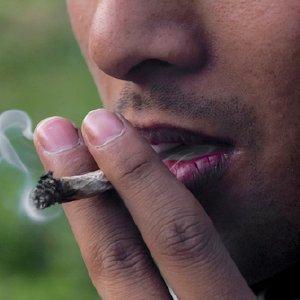Is Marijuana Healthy?

Considering that more than one in three people in America have at some point tried cannabis, the scientific name for marijuana, it might seem like it’s just a harmless herb. According to a Business Insider article, currently, only 6% of studies on marijuana analyze its medicinal properties. Whatever medical benefits may be associated with cannabis use, consuming this drug for any purpose also comes with negative effects. Before making up your mind about it, it’s important to realize that cannabis use can and does lead to dependency and messes with your memory and emotions.
While there are hundreds of chemicals in marijuana, not all of them have medicinal applications. Two that do are cannabidiol (CBD) and tetrahydrocannabinol (THC). According to the National Institute on Drug Abuse, CBD may help reduce pain and inflammation. There is also evidence that it helps control epileptic seizures. THC seems to reduce pain and inflammation and may assist a person who experiences problems controlling his or her muscles. Some people may not feel they experience side effects from the occasional use of this drug but they should know what cannabis is actually doing to their bodies and minds.
Real Physical Effects
Marijuana comes from the hemp plant, either the strain named cannabis sativa or a strain named cannabis indica. Both types contain both THC and CBD although some growers specialize in breeding variations with either very high THC/low CBD or very low THC/high CBD. THC is the component most desired by those who simply want to get high.
Marijuana is usually sold as a complete flower or as dried, crumbled leaves. THC is also separated from the plant and used to make a long list of foods including cookies, brownies, puddings, drinks, candies, and chocolates. Marijuana leaves can also be brewed into a tea. In states that have legalized medical or recreational marijuana, there have been very few restrictions put in place related to the potency of marijuana products on the market. In Colorado, doctors have reported an increasing number of people coming to their offices and emergency rooms for THC-related problems because of the high potency of some of the state’s cannabis products. And there’s little to no control of production facilities unlike with prescription drug manufacturers—meaning that there’s no real control over the dosage a person receives when they ingest one of these infused food products.
When a person smokes marijuana, the intoxicants take effect in just a few minutes. Consuming cannabis edibles is a much slower process of intoxication. It can take an hour for the THC in candies or baked goods to take effect. This delay is a common reason for overdosing on THC. A person sees no effect after 20 or 30 minutes so they eat more. In another 30 or 40 minutes, they suffer the frightening effects of a THC overdose including terror, panic, and paranoia. It may take several hours for these symptoms to abate.
When you ingest or smoke marijuana products, the drugs in the plant affect both your nervous system and your immune system. Your heart rate may speed up to two times its usual speed, and this may last for as long as three hours. This may be tolerated pretty well by the average young person but it can be dangerous for an older user or for a young user with a heart defect. This increased heart rate can lead to a heart attack in a susceptible person. Marijuana use can also lower blood pressure, increase bleeding and create abnormal blood sugar levels.
It is unknown if marijuana is linked to higher odds of getting lung cancer. Not surprisingly, smoking marijuana irritates the user’s lungs. Just like with cigarette smokers, those who regularly smoke pot are more likely to suffer from a chronic cough and lung-related problems like chest colds and lung infections.
Other physical effects of marijuana include:
- Dizziness
- Shallow breathing
- Red eyes and dilated pupils
- Dry mouth
- Increased appetite
- Slowed reaction time (If you drive after using marijuana, your risk of being in a car accident more than doubles.)
When a person stops using cannabis after a long period of using it, they are likely to suffer the withdrawal symptoms such as cravings, irritability, sleeplessness, and reduced appetite.
Changes in Mood and Mind
Most people use marijuana because they enjoy the artificial euphoria and detachment from reality. Smoking pot can also have unpleasant effects on your mind and mood. You might experience:
- A distorted sense of time
- Paranoia
- Anxiety
- Depression
- Short-term forgetfulness
These effects usually begin to fade after a few hours have passed.
Risks of Marijuana Use
Though you may have heard otherwise, marijuana can be addictive: Nearly 10% of people who use it become dependent on it. It may not be possible to prove that marijuana use causes people to move on to the use of harder drugs like cocaine and heroin, but interviews routinely reveal that the vast majority of heroin, cocaine and methamphetamine users started out with marijuana.
The amount of THC in marijuana has gone up in recent years. A few decades ago, the average batch of pot contained between 1% and 4% THC. The average of all samples collected now average 12% or above, depending on where and when they are collected. In states where it’s been legalized and therefore growers have a financial interest in breeding stronger strains to appeal to customers, the potency can exceed 30%. These high levels of THC make it much easier to become dependent on or addicted to marijuana. And, of course, the drug’s mental and physical effects will be much stronger.
Marijuana can also cause additional health problems if you have a condition like liver disease, low blood pressure, or diabetes. If you’re a man, heavy use can lower your testosterone levels, your sperm count and quality, which may reduce your libido and fertility.
Marijuana use has repeatedly been linked to an increased risk of psychiatric disorders including:
- Psychotic episodes
- Panic attacks
- Schizophrenia
- Depression
- Anxiety
- Addiction
For more than 15 years, Narconon Arrowhead has been helping those struggling with addiction. This has been the preferred drug rehab for people all over the country and even some from foreign countries. Here, you can strengthen the weaknesses that might have led you to start using drugs or drinking in the first place. With deep detoxification, a new, fresher orientation on life and life skills training, you’ll be able to envision a better, more productive future for yourself and your loved ones. When you or someone close to you needs help, call us immediately.


